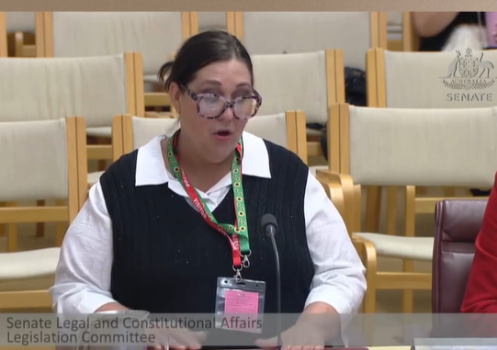Australia’s public sector whistleblower scheme is inadequate, weakened by “loopholes, inconsistencies and poor enforcement”, says a submission to a Senate committee examining the Whistleblower Protection Authority Bill.
Such defects mean “that even legally protected whistleblowers often face retaliation, with few remedies in practice”, says Transparency International Australia. To strengthen the current scheme, TIA supports the establishment of “a fully resourced whistleblower protection authority … to ensure workers can access their rights”.
The TIA was one of more than 80 submissions the Senate Legal and Constitutional Affairs Legislation Committee received on the Bill earlier this year.
The Bill – introduced by Independent MPs Andrew Wilkie and Dr Helen Haines and Senators David Pocock and Jacqui Lambie – proposes the establishment of an independent statutory authority – the Whistleblower Protection Authority – which would act as a one-stop shop for whistleblowers. It would also provide for the appointment of a whistleblower protection commissioner.

“The case for a whistleblower protection authority has been made over and over again: in Senate inquires and law reform reports dating back three decades. Yet whistleblowers in this country continue to be punished, prosecuted, and abandoned after speaking out in the public interest, says Senator Pocock in the report. “This Bill offers parliament the opportunity to change course. To move from patchwork to principle. From rhetoric to reform. From betrayal to protection.”
Currently, Australia has multiple overlapping legislative regimes that “create confusion for both individuals seeking to make disclosures and the entities responsible for responding to them”, says the report – released 29 August.
The Human Rights Law Centre highlighted that there are currently nine different federal whistleblower laws in operation, “contributing to a lack of clarity and coherence”. The current system often means one thing: public sector whistleblowers “are left vulnerable, unsupported, and at risk”.
Australia has failed its whistleblowers.
The Australia Institute described the Public Interest Disclosure Act – which lays out whistleblower protection laws – as “deeply flawed”. Despite amendments introduced in 2023, “the legislation remains difficult to interpret and apply, both for legal professionals and public servants”, says the report.
The Australian Human Rights Commission highlighted the invaluable public service that whistleblowers provide. “In performing that service, whistleblowers may experience great personal cost.”
In the AHRC’s view, a whistleblower protection authority would help to protect whistleblowers “by making it easy for whistleblowers to know where to go to make a report about wrongdoing, by assisting them with appropriate advice, and by taking steps to protect them from reprisals and victimisation”.
The Community and Public Sector Union highlighted the importance of ensuring there are robust protections for whistleblowers. It referred to the experience of public servants raising concerns about the Robodebt scheme. “As a union, we have seen situations where public servants are aware of wrongdoing, but their attempts are hobbled by the existing structures and a lack of protections … they were silenced, ignored or punished,” says Ms Rebecca Fawcett – CPSU deputy secretary.
To deter that from occurring, Ms Fawcett suggested that the WPA have the power to investigate such unjust repercussions. “Public sector workers should not be forced to decide between their own job security and making whistleblower disclosures,” she said. “Workers should also not have to choose between doing what is right and their psychological safety.”

Ms Jeannie-Marie Blake – a former Centrelink employee who blew the whistle on Robodebt – shared the trauma caused by a lack of institutional support. “I experienced firsthand the absence of support for whistleblowers and that’s why I’m firm in my belief that we need whistleblower reform, including the establishment of a whistleblower protection authority.”
When Ms Blake and colleagues attempted to blow the whistle, the message from Services Australia was blunt: “shut up or leave”.
As Ms Blake notes in her submission, others have been prosecuted for blowing the whistle and imprisoned for speaking up. “There are dozens more that have had their careers ended or sidelined for doing the right thing,” she says. “For this reason alone there should be some sort of mechanism for whistleblower support.”
Former CEO of Logan City Council in Queensland – Ms Sharon Kelsey – shared a similar experience. In 2017, Ms Kelsey made a public interest disclosure to the Queensland Crime and Corruption Commission about the conduct of the then mayor of Logan. In February 2018, her employment was terminated. “What is evident is that my PID offered me little-to-no real protection as a whistleblower. There was no agency with the adequate function and powers to protect or support me,” says Ms Kelsey.
Lives have been ruined, corruption has been left unexposed.
The bipartisan report concluded: “For decades, Australia has failed its whistleblowers. We have passed laws that look good on paper but provide little in practice. The result is that lives have been ruined, corruption has been left unexposed, and public trust has been eroded.
The evidence before this committee could not be clearer, says the report. The establishment of a whistleblower protection authority “would provide the infrastructure of trust: a single, independent body with the power to support whistleblowers, investigate reprisals, and enforce protections”.
The time for delay is over, says the report. “If the government is serious about integrity, about accountability, and about restoring public trust, then it must support the establishment of a whistleblower protection authority. Anything less would be a betrayal of those who speak up, and of the Australian public they seek to protect.”




Leave a Reply